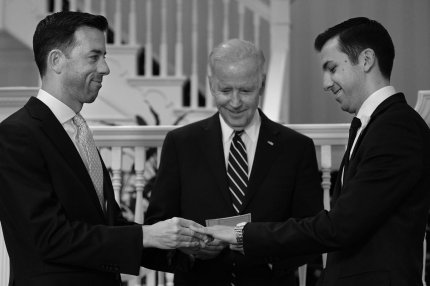GOPer Posts False Accusation Against Dem Hopeful Pete Buttigeig
A post published on the website Medium accusing Democratic presidential hopeful Pete Buttigieg of sexual assault was fabricated as part of a smear campaign led by two right-wing agitators.
Republican lobbyist Jack Burkman and provocateur Jacob Wohl had been looking for young men willing to accuse Pete Buttigieg of sexual misconduct as part of their plan to stop the candidate’s momentum, The Daily Beast reported.
Buttigieg, an openly gay veteran who serves as the mayor of South Bend in Indiana, was given little chances to win the Democratic nomination when he first announced the creation of an exploratory committee in January. But the 37-year-old’s star has kept rising, landing him among the top polling candidates in the crowded Democratic presidential field.
“It’s important for everyone to know that I was not sexually assaulted and would never falsely accuse anyone.”
— Hunter Kelly
The Medium account that posted the false accusation bore the name of Hunter Kelly, a 21-year-old gay Republican college student who told The Advocate he was flown to Washington, DC, by Burkman and Wohl.
Kelly said he landed just past midnight on Monday (April 29) and stayed the night at Burkman’s place. After waking up in the morning, he discovered Burkman and Wohl published a statement accusing Buttigieg of sexually assaulting him in February via a Medium account named @RealHunterKelly, and spread it on Twitter after creating an account under the same name. Both accounts have since been suspended from their respective platforms.
Hunter Kelly denies sexual assault claims against Pete Buttigieg
Kelly gave statements to both The Daily Beast and The Advocate denying he had any role in concocting the false allegations against Buttigieg, and later published a statement via his Facebook account bearing the headline: “I WAS NOT SEXUALLY ASSAULTED.”
The post reiterated the version of events shared with the two publications. It read: “It’s important for everyone to know that I was not sexually assaulted and would never falsely accuse anyone. To keep it brief for now- I was approached by a political figure to come to DC to discuss political situations from the standpoint of a gay Republican.
“When I arrived they discussed Peter Buttigieg and started talking about how they would be working a campaign against him. I went to bed and woke up to a fake Twitter @RealHunterKelly and an article that I in no way endorsed or wrote.
| More from PinkNews | ||
|---|---|---|
| Stars You Didn’t Know Were Gay Or Bisexual | The Stars You Didn’t Know Have An LGBT Sibling | The Straight Stars Who Went Gay For Pay |
“I have since left and am working on a formal statement to give to everyone including the Buttigieg family. Thank you for standing behind me and knowing that I would never accept or allow any of this.”
Speaking to the press on Monday, Buttigieg commented: “I’m sure it’s not the first time somebody is going to make something up about me.”
He added: “It’s not going to throw us. Politics can be ugly sometimes but you have to face that when you’re in presidential politics.”
Wohl’s Twitter account has since been suspended, while his father David Wohl, who prominently displays a picture of him, President Donald Trump, and his son on his Twitter account, has deleted a tweet in which he shared news of the Medium post.

Burkman stood by his version of the story, posting pictures of a statement he said Kelly signed, attesting to his accusations, and a picture of Kelly showing his student ID. “MSM [mainstream media] bullied him & his family into submission,” Burkman claimed in his post.
But Kelly told The Advocate Wohl and Burkman forced him to sign and and take the photo. “I had no say in either. In the photo you can clearly see I had been crying,” he said.
Another young man, who asked for anonymity for fear of reprisal, told The Daily Beast he had been contacted by Wohl and Burkman him last week with a plan to accuse Buttigieg of sexual assault.
The man provided the publication with a recording of the encounter which was not published to protect his identity, but was independently examined by an expert in audio forensics who confirmed Wohl was one of the speakers recorded in the conversation.
Wohl was previously found to have fabricated death threats against himself and to have falsely moved sexual assault allegations against special counsel Robert Mueller.







